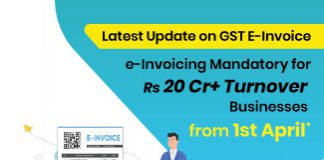Tag: e-Invoicing is Mandatory On 20 Crore Turnover for B2B Businesses in India
e-Invoicing is Mandatory On 20 Crore Turnover for B2B Businesses in India
E-invoicing Under GST with Latest Update
11 October 2022
As per the sources' reports, the central board of indirect taxes may impose the next phase of e-invoicing for businesses whose turnover is more than 5 crore or from January 1, 2023. Also, by the end of 2023, it may extend to companies with a revenue of 1 crore or more.
16 August 2022
Taxpayers are permitted to use the e-Invoicing system if their annual revenue exceeds Rs. 10 crores.
According to the GST department, the GST e-invoice system has sanctioned e-invoicing for taxpayers having turnover of more than Rs. 10 crore.
This e-invoicing system is applicable for GST-registered persons, they have to upload all the B2B invoices to the invoice registration portal (IRP). The IRP creates and provides the user with a distinct Invoice Reference Number (IRN), a digitally signed e-invoice, and a QR code.
4th July 2022
According to a government official, in order to lower the barrier from the existing Rs 20 crore, the government intends to make GST e-invoicing mandatory for businesses with a turnover of Rs 10 crore and higher from 1-10-2022.
24th February 2022
According to Notification No. 1/2022, the e-Invoicing system will be made available to businesses with an annual turnover of more than Rs. 20 crore and up to Rs. 50 crore as of April 1, 2022.
30th June 2021
The CBIC has issued a notification proposing to waive the penalty imposed for non-compliance with dynamic QR code regulations for B2C invoices between December 1, 2020, and September 30, 2021.
1st June 2021
A government department and local authority are exempt from the e-invoicing system, according to CBIC's Central Tax Notification No. 23, dated June 1, 2021.
30th March 2021
The CBIC has published a notification to waive the fine for failing to follow the rules for dynamic QR codes for B2C invoicing between 1 December 2020 and 30 June 2021, provided that the person in question complies with the notification's requirements starting on 1 July 2021.
To Whom E-invoicing is Applicable?
The first phase of e-invoicing for taxpayers with an aggregate turnover of more than Rs.500 crore commenced on October 1, 2020, according to Notification Nos. 61/2020-Central Tax and 71/2020-Central Tax. Starting January 1, 2021, e-invoicing was expanded to firms with an aggregated revenue above Rs.100 crore, as per Notification No. 88/2020.
After that, on April 1, 2021, the CBIC issued Notification No. 5/2021, requiring businesses with a turnover of more than Rs.50 crore to begin adopting e-invoicing.The CBIC issued Notification No. 1/2022, requiring businesses with a yearly turnover of between Rs.20 crore and Rs.50 crore to implement the e-invoicing system, on February 24, 2022.
E-invoicing is required if a taxpayer's turnover exceeds a particular threshold in any fiscal year from 2017-18 through 2021-22. Furthermore, the total turnover will include all GSTINs in India under a single PAN.
For Whom E-invoicing is Not Applicable?
For the time being, as stipulated in CBIC Notification No.13/2020 – Central Tax, e-invoicing will not be applicable to the following types of registered persons, regardless of turnover:
Insurance, a bank, or a financial institution (including a non-banking financial organization) are all examples of financial institutions (NBFC).
A Goods Transport Agency (GTA)
An individual who has been granted a passenger transportation license.
A registered individual who provides services such as admission to multiplex cinematographic film screenings.
A special economic zone (SEZ) is a tax-free zone (under CBIC Notification No. 61/2020).
A government department and a local government (both of which are exempt under CBIC Notification No. 23/2021 – Central Tax) are two examples of government entities that are not subject to the Central Tax.
What is e-invoicing under GST?
'e-Invoicing' also known as 'electronic invoicing' is a technique by which the GSTN electronically authenticates B2B invoices before enabling them to be utilized on the common GST portal. The GST Network's Invoice Registration Portal (IRP) will assign an identification number to each invoice submitted through the electronic invoicing system (GSTN).
The GST and e-way bill portals will receive all invoice information in real-time from this site. The requirement for manual data entry for filing GSTR-1 returns and generating Part-A of e-way bills will be eliminated because the information is transferred directly from the IRP to the GST site.
Free Download E-invoicing Software
What is the Process of Generating an Electronic Invoice?
The taxpayer must guarantee that the ERP system is in compliance with GST requirements. He could work with the software service provider to incorporate the e-invoice standard set, i.e. the e-invoice schema (standards), or at the very least have the CBIC report the mandatory parameters.
Any taxpayer has primarily two choices for IRN generation:
The IP address of the computer system can be whitelisted on the e-invoice site for direct API connectivity or integration via GST Suvidha Provider (GSP).
Download the bulk generating application to upload invoices in bulk. It will produce IRNs in big batches using a JSON file that can be uploaded...

